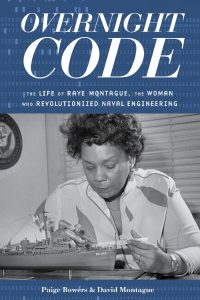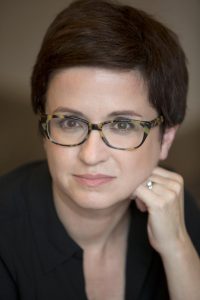Talking About Women’s History: Three Questions and an Answer with Paige Bowers
Last year I interviewed Paige Bowers about her biography of French resistance fighter Geneviève De Gaulle. This year I delighted to have her back to talk about women’s history and her next book, Overnight Code: The Life of Raye Montague, The Woman Who Revolutionized Naval Engineering—another biography of a woman we should have heard of. It comes out on January 12, 2021, and I am eager to get my hands on a copy.
Paige successfully navigates the world between journalism and history with curiosity, intelligence and a strong narrative voice. In addition to writing biographies of fascinating women, she is a nationally published news and features writer whose work has appeared in TIME, USA Today, The Wall Street Journal, The New York Times, People, Allure, Thomson Reuters, Glamour, Pregnancy, AirTran Airways’ Go, The Atlanta Journal-Constitution, Atlanta Magazine and Palm Beach Illustrated.
Take it away, Paige!
Your forthcoming book is a biography of Raye Montague, the first person to design a Naval warship by computer. How did you come across her story? Was your experience of writing her story significantly different that writing about Genevieve De Gaulle, who was the subject of your previous book?
My agent, Jane Dystel, gets all the credit for coming across Raye’s story. Jane saw Raye on “Good Morning America” one day and approached the family about doing a book. After that, she approached me about helping Raye write a proposal, and then her memoir. In truth, I was an intimidated at first. I was never much of a math and science student, so the thought of writing about those subjects, early computers, and the particulars of ship design was unbelievably scary to me. But I was captivated by Raye’s story and didn’t want it to be lost to history, so I committed to the project. It didn’t hurt matters that Raye and I had a good rapport, and she was such a funny, lively storyteller. That’s a dream, right there! As far as I was concerned, I could do the extra work figuring out the finer points of ship design as I went. And I did.
With my first book, I was unable to meet Genevieve de Gaulle, who had passed away at least a decade before I wanted to write about her. So I relied on some of her papers, and interviews with family and close associates. On the other hand, with Raye’s story, I had her there, telling me the stories of her life, making me laugh, at least for a time. Unfortunately, she passed away just as a publisher became interested in her book. So we shifted the project from a memoir, to biography, and I spent the next year working closely with Raye’s son, David, in sifting through her papers, conducting interviews, and crafting the narrative of her remarkable life.
How does your experience as a journalist inform your work as a biographer?
I started devouring biographies at a very tender age, long before I had any idea of what I wanted to do with my life. Journalism and history aside, the simple truth is that I’ve always just been very curious about other people — who they are, where they’re from, why they’ve made the choices they’ve made, what their dreams are, what their regrets are, how they’ve overcome hard times, and so on. I feel like we can learn so much by asking people a bunch of questions and sitting back and listening to how they respond, or sifting through their letters and journals to see what they really thought about a given event. At least that has always been the case for me. I tend to get pretty excited about the stories I find, and I’ve been fortunate to write for organizations that have supported this lifelong enthusiasm. I’d like to believe my curiosity and passion come through when I write. Hopefully readers pick up on it, and get as excited by these lives as I do.
What was the most surprising thing you found doing historical research for your book? And when will the new book come out? Because some of us (and by that I mean me), are eager to read it. (And yes, I know that’s two questions masquerading as one.)
There were a handful of truly surprising things I discovered as I went through Raye’s papers and interviewed people in her circle, but I’m reluctant to give too much away before the book comes out! I will say that Raye was a woman of tremendous focus who overcame all manner of odds to accomplish her dream of becoming an engineer. Her perseverance and resilience are truly awe-inspiring, and it’s lives like hers that have paved the way for women to have a seat at the table in a way they hadn’t before.
I can’t wait for readers to meet her. The book comes out from Chicago Review Press in January, 2021!
My question for you: I find your footnotes so entertaining. When did you start writing such fun footnotes and why? Do you think more people need to loosen up in their footnotes? Who writes some of your favorite footnotes and why? (I realize that’s a couple of questions masquerading as one, but two can play that game.)
I started writing chatty footnotes that function as asides to the reader in graduate school. And since no one stopped me I kept doing it, first in my blog posts and later in Women Warriors. I’ve always seen them as a way to share my own reactions to the story I’m telling, whether it’s a snarky aside, outrage, or just a thread I want to follow. A woman who was in the audience at a talk I gave recently said it better than I can: she said they made her feel like she was having a conversation with me about the book. That made me very happy.
As far as other people’s work goes, if a footnote with their personal voice feels natural to them, I would encourage them to go for it. Even if you decide to take them out later, it’s a useful way to explore what you think.
My personal favorite writer of footnotes today is Benjamin Dreyer. His footnotes in Dreyer’s English are an appealing combination of intelligence, attitude and intimacy with the reader.
.

Want to know more about Paige Bowers and her work?
Check out her website: http://www.paigebowers.com/
Follow her on Twitter: @paigebowers
* * *
Join me tomorrow for three questions and an answer about women’s history, food, and sexuality with literary scholar Etta M. Madden.





